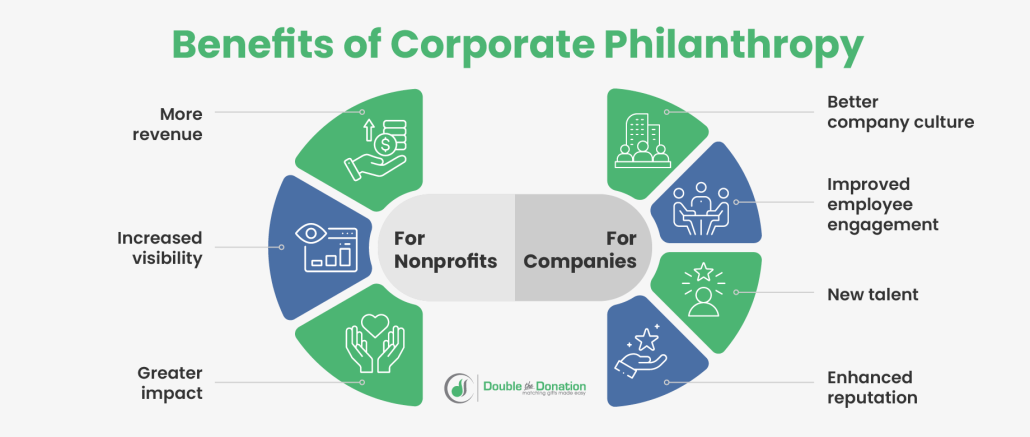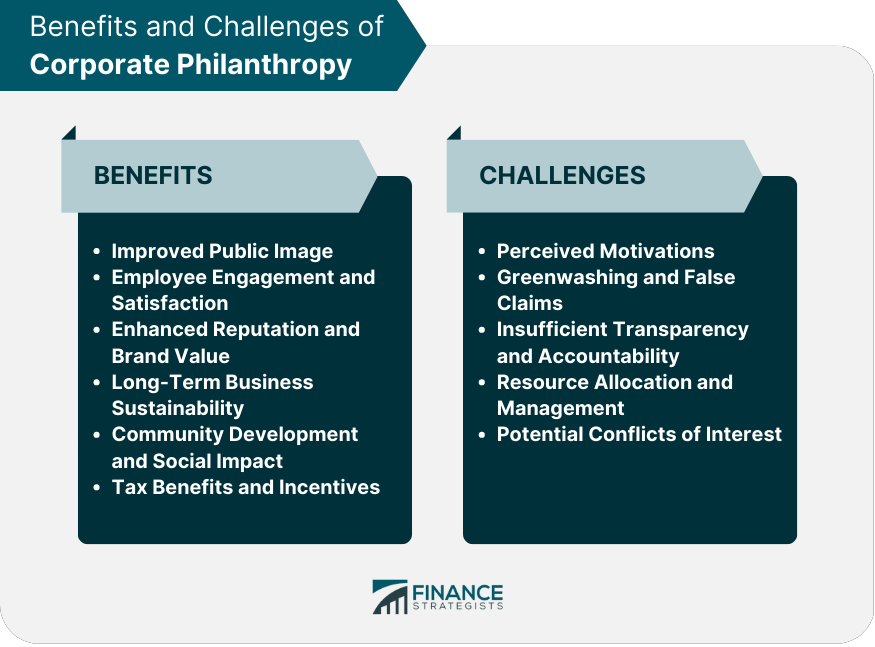The hidden impact of corporate philanthropy on education equity
Wiki Article
Checking Out Exactly How Corporate Philanthropy Shapes Brand Name Online Reputation and Client Loyalty
Company philanthropy substantially affects brand online reputation and consumer loyalty. Companies that involve in authentic charitable campaigns commonly see a positive shift in just how consumers perceive them. This placement of values promotes depend on and psychological links with audiences. However, the performance of these philanthropic initiatives can vary greatly. Comprehending what truly resonates with customers is necessary for brands looking for to enhance their social effect and market position. What methods will become necessary for future success?The Evolution of Business Philanthropy
As businesses progressively identify their role in culture, the evolution of business philanthropy has actually transformed from simple philanthropic donations to a calculated part of brand identity. Originally, companies participated in philanthropy mainly for tax benefits or to enhance their public photo. Over time, this technique moved as stakeholders-- consisting of customers, financiers, and employees-- demanded a more genuine commitment to social responsibility.Organizations started straightening their philanthropic campaigns with their core values and organization goals, bring about even more impactful and thoughtful contributions. This change has encouraged business to invest in lasting methods and area growth, cultivating a sense of purpose that reverberates with customers.
In addition, technological improvements have helped with transparency and interaction, enabling companies to showcase their humanitarian initiatives more effectively. Corporate philanthropy has emerged as an indispensable part of organization approach, with companies embracing the possibility to favorably affect culture while improving their total brand name story.
The Impact of Philanthropy on Brand Name Perception
While companies involve in humanitarian efforts to promote social great, these initiatives greatly form brand assumption amongst consumers. Company philanthropy can enhance a brand's image by linking it with favorable social effect and neighborhood involvement. Consumers commonly view brands that proactively join charitable activities as even more trustworthy and responsible. This perception can influence purchasing choices, as consumers might prefer brand names that show a dedication to social issues.
Building Emotional Connections With Offering
Company philanthropy serves as a powerful tool for improving brand identification by connecting company values with neighborhood demands. Via tactical providing, business can promote area involvement and create shared values that resonate with consumers on an emotional level. This method not only enhances brand online reputation yet also builds lasting connections between companies and their stakeholders.Enhancing Brand Identity
When business engage in humanitarian initiatives, they not just add to social good but also create deeper psychological links with their target markets. By straightening their brand name with philanthropic reasons, companies improve their identity and signal values that resonate with customers. This placement produces a narrative that goes beyond products and solutions, welcoming clients to take part in a shared mission. As customers increasingly focus on purpose-driven brand names, firms that proactively engage in giving can differentiate themselves in a jampacked market. Such campaigns promote a sense of commitment amongst consumers that feel personally connected to the brand's values. Inevitably, company philanthropy ends up being a necessary tool for enhancing brand name identity, cultivating enduring relationships based on shared ideas and psychological involvement.Fostering Neighborhood Interaction
Various studies indicate that firms participating in community-focused humanitarian efforts can substantially reinforce emotional connections with their stakeholders. By purchasing neighborhood jobs and supporting social causes, services grow a sense of belonging and depend on within the community. This involvement fosters a positive brand image, as customers appreciate companies that show real worry for societal issues. Employees typically really feel extra motivated and proud to be linked with a company that focuses on community welfare. Therefore, consumers are more probable to create commitment in the direction of brand names that proactively add to meaningful causes. Inevitably, cultivating area involvement through philanthropy not only improves brand online reputation yet additionally builds long lasting psychological ties that benefit both the neighborhood and the firm it offers.Creating Shared Values
How can businesses efficiently produce common values that reverberate with their stakeholders? Companies can achieve this by aligning their humanitarian efforts with their core objective and the rate of interests of their neighborhoods. By taking part in initiatives that address local needs, companies foster emotional connections with customers, boosting brand name commitment. As an example, partnering with non-profits that reflect shared values strengthens the brand name's image and shows dedication to social obligation. Additionally, transparent communication about these efforts enables stakeholders to see the tangible influence of their payments. Eventually, by incorporating common worths right into their company philanthropy, companies not just enhance their online reputations however also cultivate long-term partnerships with clients, leading to increased commitment and count on. This alignment is crucial in contemporary customer decision-making.Situation Researches: Effective Philanthropic Campaigns
Checking out successful kind projects exposes various methods that enhance brand reputation. Impactful neighborhood campaigns, innovative collaboration versions, and lasting interaction strategies have verified effective in fostering favorable links with consumers. These study highlight the significance of thoughtful business providing in attaining both social and company goals.Impactful Area Initiatives
Many business have effectively leveraged kind projects to enhance their brand track record while making a purposeful influence in their communities. For instance, an innovation company released an electronic literacy program in underserved neighborhoods, offering training and resources that equipped regional homeowners. This effort not only added to neighborhood advancement however additionally placed the business as a socially accountable leader. In a similar way, a significant food business executed an appetite relief campaign, partnering with local nonprofits to disperse dishes to households in requirement. This effort strengthened community connections and cultivated client loyalty. With these impactful initiatives, companies have shown their dedication to social responsibility, successfully aligning their brand worths with the demands of the neighborhoods they serve, ultimately enhancing their total track record.Ingenious Partnership Versions
The success of impactful area efforts typically depends upon cutting-edge collaboration designs that combine varied stakeholders to attend to complicated social challenges. Case researches show how corporations, non-profits, and federal government entities can team up efficiently. An international company partnered with a neighborhood non-profit to introduce an education program, merging you can try this out sources and expertise to improve community literacy rates. An additional example included a technology firm and a healthcare company signing up with forces to establish a telemedicine service for underserved populations. These collaborations not only magnified the reach of kind efforts however additionally reinforced the brands' online reputations by aligning their objectives with area needs. Ultimately, ingenious collaboration versions work as a catalyst for significant adjustment and foster more powerful connections between brand names and their customers.Lasting Engagement Techniques

Gauging the ROI of Company Social Duty
As business progressively invest in corporate social duty (CSR) campaigns, comprehending the return on financial investment (ROI) connected with these efforts comes to be necessary. Determining ROI in CSR is multifaceted, usually incorporating both quantitative and qualitative metrics. Financial returns can be analyzed with increased sales, boosted brand name loyalty, and improved staff member spirits, which can result in higher productivity. In addition, business may evaluate cost financial savings connected to sustainable techniques, such as decreased waste or energy usage.Qualitatively, the effect of view website CSR on brand online reputation can be examined with customer understanding researches and social media sites sentiment evaluation. Surveys can give insights right into just how CSR tasks affect consumer loyalty and depend on. Furthermore, benchmarking versus sector standards can assist companies gauge their CSR efficiency. Inevitably, an extensive strategy to measuring ROI enables business to make enlightened choices about future CSR investments, lining up approaches with both financial performance and social effect
Customer Assumptions and Company Duty
Increasingly, consumers expect companies to operate with a strong feeling of company duty, watching ethical practices as a prerequisite for brand commitment. This change in expectation reflects a growing awareness of environmental and social issues, leading clients to favor brands that line up with their values. Consumers are a lot more inclined to support business that take part in transparent methods, demonstrate sustainability, and add favorably to their neighborhoods.Furthermore, social media enhances these expectations, allowing consumers to share their read this article opinions and experiences promptly. Brands that fail to meet these moral criteria run the risk of backlash, while those that welcome company obligation frequently enjoy superior track record and client loyalty. As consumers require responsibility, business must integrate corporate social responsibility into their core approaches, focusing on honest behavior not equally as an advertising and marketing method, but as a basic element of their operations. This alignment can inevitably cause stronger brand name fondness and sustained success in affordable markets.
Future Trends in Corporate Philanthropy and Brand Commitment
The landscape of business philanthropy is advancing, influenced by the intense consumer assumptions surrounding company responsibility. Firms are increasingly incorporating social effect right into their core company techniques, not just as a supplementary task. Future trends show a change toward transparency, with brands sharing detailed details regarding their humanitarian campaigns and their direct impacts on areas.Additionally, technology is playing a vital role, allowing real-time engagement between brands and customers. Social media site systems help with straight communication, permitting consumers to articulate their expectations and hold brand names accountable. Additionally, younger generations, specifically Millennials and Gen Z, prioritize sustainability and moral practices, driving services to adopt more conscientious strategies.
As company philanthropy ends up being synonymous with brand identification, business that authentically straighten their objectives with societal requirements are most likely to cultivate more powerful client commitment. This convergence of values will eventually form the future of corporate online reputation and consumer connections in an increasingly conscientious marketplace.
Frequently Asked Concerns
How Do Consumers Find Out About a Business's Philanthropic Efforts?
Customers find a firm's humanitarian initiatives via numerous networks, consisting of social media, press launches, community occasions, and word-of-mouth. These avenues help with recognition, allowing individuals to involve with brands that straighten with their worths and passions.What Role Does Staff Member Participation Play in Corporate Philanthropy?
Worker involvement in company philanthropy boosts involvement, promotes a feeling of possession, and strengthens team communication - corporate philanthropy. This involvement usually intensifies the effect of philanthropic campaigns, leading to higher recognition and assistance for the business's kind initiativesCan Corporate Philanthropy Backfire on a Brand name's Reputation?
Corporate philanthropy can undoubtedly backfire on a brand's track record if perceived as opportunistic or insincere. Unfavorable public assumption might emerge, resulting in diminished count on and loyalty amongst customers who prioritize credibility in company activities.Are Smaller Business as Efficient in Philanthropy as Larger Firms?
Smaller companies can be just as effective in philanthropy as larger firms, typically showing dexterity and authenticity. Their localized initiatives may resonate extra deeply with neighborhoods, fostering genuine links in spite of minimal sources compared to their larger counterparts.How Can Companies Pick the Right Causes to Support?
Business can select the right causes by aligning their values with community requirements, analyzing stakeholder passions, and evaluating prospective effect. This critical method promotes authenticity, improves engagement, and strengthens links with clients and the wider area.While firms involve in humanitarian efforts to promote social good, these initiatives significantly form brand name perception among consumers. As customers increasingly focus on purpose-driven brand names, companies that proactively engage in providing can distinguish themselves in a crowded market. Many business have successfully leveraged kind campaigns to enhance their brand name track record while making a purposeful influence in their areas. Increasingly, customers anticipate firms to run with a solid feeling of corporate obligation, watching moral techniques as a requirement for brand loyalty. As business philanthropy becomes synonymous with brand name identity, business that authentically straighten their objectives with social needs are likely to cultivate more powerful client loyalty.
Report this wiki page